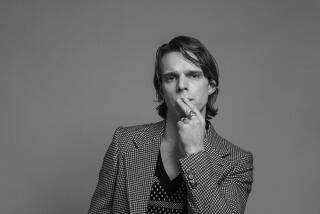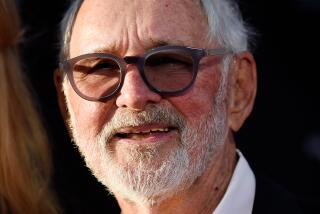The ‘Heat’ Is Off : Off the Air, That Is. Groundbreaking Drama Ends Its Long Run
- Share via
CBS’ “In the Heat of the Night,” which winds up a seven-year run with a two-hour finale tonight, seemed like a jinxed series from Day 1, despite the presence of a premier television star, Carroll O’Connor.
And, as it turned out, the show’s viewing public only knew the half of it.
Filmed far from Hollywood, primarily in Covington, Ga., a suburb of Atlanta, bits and pieces of the show’s struggles both behind the scenes and on camera kept emerging, making one wonder about the future of this police series based on the 1967 movie and set in Mississippi.
Playing opposite O’Connor, the brilliant actor Howard Rollins suddenly was involved in news stories about alleged drug and alcohol use, and eventually served a brief jail sentence stemming from traffic violations. O’Connor, meantime, underwent heart-bypass surgery.
While all that was getting attention, few--except those with a closer knowledge of the show--knew that it was faced with another wrenching problem: the drug addiction of O’Connor’s son Hugh, who played a law enforcement officer in the series and appears in tonight’s episode.
That revelation became tragic public knowledge when the younger O’Connor committed suicide on March 28, shooting himself at the age of 32. The elder O’Connor has been, and continues to be, open and frank about the circumstances that led to his son’s death.
“Everybody in the show knew--and I knew--what was going on,” says the 70-year-old O’Connor, who had become a television icon as the bigot Archie Bunker in the great comedy series “All in the Family.”
Amid the difficult behind-the-scenes circumstances in the series, the elder O’Connor nonetheless had the tenacity to press for--and pull off--an interracial romance between himself and a middle-age African American woman portrayed by Denise Nicholas, which eventually resulted in marriage between the two characters.
At the same time, while network TV continues to lag sadly in its presentation of black family life in drama series, “In the Heat of the Night,” without making a big deal of it, quietly kept presenting African Americans in responsible, everyday roles.
If it was not a groundbreaking show about the realities of black urban life, it was surely more than most network television viewers might have expected from a down-home cop series.
As a result, “In the Heat of the Night” won two NAACP Image Awards for best television drama series.
No problems on “In the Heat of the Night” could compare to the drug nightmares or O’Connor’s heart bypass. But there were the additional, if less dramatic, TV hurdles as well. The sensitive interracial story was one. Then there was the question of whether the public would accept O’Connor in a role so different from “All in the Family.”
And in an intramural slap in the face, NBC, which launched “In the Heat of the Night” in 1988, dropped it in 1992 despite its success because the show attracted an older audience and the network was looking to go younger to please sponsors. CBS snapped up the series, but it now has run its course.
In both the past and present, whenever O’Connor has spoken of Rollins publicly, he has done so with compassion. And now the death of Hugh, and the disclosure of his long involvement with drugs, perhaps gives a greater understanding and poignancy to that compassion.
Did O’Connor hear from Rollins after Hugh’s death?
“Sure,” says the actor. “He was very shattered. He was very fond of Hugh. He was very, very emotional. He said, ‘I know what Hugh was going through.’ ”
O’Connor publicly stood by Rollins during the turmoil at “In the Heat of the Night.” They played fellow police officers. Eventually, Carl Weathers was brought in as O’Connor’s new co-star, playing the police chief while O’Connor portrayed a sheriff, and Rollins became a law student and then an attorney who appeared only occasionally.
Many may wonder how the backstage problems, personal tragedies and bypass operation affected O’Connor’s ability to continue with the series, particularly since he had taken it upon himself to be personally responsible for the show and its thrust.
“The question sort of has its own answers built in,” he says. “I was so busy doing so many things. I had to get the work done. And I couldn’t just sit down and start feeling sorry for myself. I didn’t have the time.
“The busyness was great therapy for me. I could have been shattered by everything--’I can’t work anymore. I’m going to give this thing up.’ I wouldn’t want to do that. I liked what I was doing. I liked my job.”
Hugh’s death, of course, was still ahead, and in speaking of him O’Connor calls him “my darling son.” They worked together on “In the Heat of the Night” from the beginning.
The role of Bill Gillespie in the police series was obviously a lot closer to the personal beliefs of the elder O’Connor than his part in “All in the Family,” for which he won four Emmy Awards before adding a fifth for “In the Heat of the Night.”
“Archie Bunker had nothing to do with my personal views,” he notes.
“I might just interject that a lot of people, particularly country people, in the South, the West and the Southwest and so forth, always regarded ‘In the Heat of the Night’ as a more important show than ‘All in the Family.’
“It spoke to a life in their hometowns. They’re a little bit fed up with metropolitan stuff. And they have the same crimes to cope with as everybody else and the same situations. They thought we got awfully close to what life is becoming in the South and in the small towns.”
He is frank about reaction to his interracial romance and marriage on the show.
“A lot of people thought I was forcing that because of my own views about race relations. They thought I was kind of grinding an ax for the idea of integration--sexual integration too. But a lot of people saw the truth of what we were playing.
“I was not grinding an ax. I always played the thing for reality. This was a man who was alone, a widower. Here was a woman who was alone. They both worked for the city. They had a lot of things they had to work on together. We fell in love.”
For all its impact, that was fiction. Hugh was reality, and O’Connor is dealing with the loss openly, as best he can. But is he thinking of perhaps easing off after the tragedy, the close call with his health and the fact that he has had two successful series?
“I’ve heard actors say they’re retiring; you offer them a part and they’re right back. I’m in pretty good shape. I feel energetic. I feel sad at the moment, but I’ll have to get over that. Yes, if there’s something interesting to do, I’ll do it. Listen, I’ll be grateful if there’s something interesting to do. Grateful.”
* “In the Heat of the Night” airs tonight at 9 on CBS (Channel 2).
More to Read
The complete guide to home viewing
Get Screen Gab for everything about the TV shows and streaming movies everyone’s talking about.
You may occasionally receive promotional content from the Los Angeles Times.






